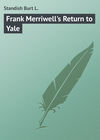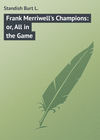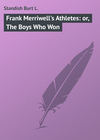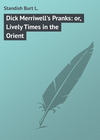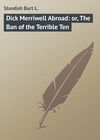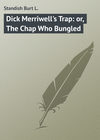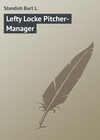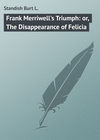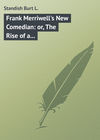Kitabı oku: «Frank Merriwell's Return to Yale», sayfa 17
CHAPTER XL
REJOICING AT YALE
Harris found his opportunity to slip away when the train drew into the station at New Haven.
A band of music was on hand to meet the returning conquerors. A wild mob of screaming, cheering, horn-tooting students was there.
It was evening, and the Yale lads had come down to the station with torches, prepared to give the eleven such a reception as no other football team had ever met.
When the train drew into the station, the band was hammering away at a blood-stirring tune. When the train stopped, the great crowd of young men and boys presented a perfect sea of upturned faces beneath the flaring light of the torches. Blue was everywhere. It was Yale's great day, and all New Haven wore the color.
The train stopped. Then there was a fierce swaying and surging of the crowd, a flutter of flags, followed by a mighty cheer that was like a savage yell of joy over the downfall of a defeated and slain enemy.
How they shouted for Yale! How they swayed and surged! How like lunatics they were!
The sound of the band was drowned, and not a strain of music could be heard. The musicians continued to play, but they might have saved their breath.
The crowd knew well enough that the eleven would be on the smoker. That was the car in which the victors could disport themselves as hilariously as they pleased.
The smoker began to discharge its passengers. Paul Pierson was the first to get off, and he was followed closely by a stream of Yale men.
The general cheering had died down, but almost every man who stepped from the train was greeted in some peculiar manner.
"What's the matter with Yale?" howled a voice.
Then a thousand throats seemed to roar back:
"She's all right! 'Rah! 'rah! 'rah! 'Rah! 'rah! 'rah! Yale!"
Bruce Browning appeared.
"Hey, Brownie!" cried some one on the platform. "How's your corns?"
"Sore," answered the big fellow. "Strained 'em cheering for Yale."
Bink Stubbs came forth riding astride Puss Parker's shoulders. Somewhere on the train he had captured a silk hat that was much too large for him, and it had dropped down over his head to his ears, which were lopped forward by the weight of it. In the hatband was stuck the short staff of a small flag. Bink had a horn, and he blew a hoarse blast the moment he was outside the car.
"Where'd you get that horn?" called a voice.
"This horn's nothing," returned the little fellow. "I've had about twenty horns besides this, and still my neck is dry."
Four fellows came off the car, carrying a fifth. They held their caps in their hands, and were as mournful and sad-appearing as possible. The one who was carried had a big white placard on his breast. On the card were these words:
"I bet a dime on Harvard, and dropped dead after the game!"
It was not an easy thing to carry him down the steps, but the mournful-appearing bearers succeeded in doing the trick.
Dismal Jones came forth from the car. He was holding a handkerchief to his eyes and pretending to weep.
This brought a shout of delight, and some one yelled back:
"Weep for poor old Harvard. She needs it."
Then Capt. Forrest of the eleven appeared.
A mighty roar went up the moment he was seen. It was a great shout of admiration and welcome. It brought a hot flush of satisfaction to his cheeks, and he stood bowing and smiling on the platform.
"What's the matter with Forrest?" shrieked a voice, when the noise lulled somewhat.
"He's a lulu!" shrieked another voice.
"He's all right – he is!" roared the crowd.
Then they cheered for him in the regular manner.
Each player was received with an ovation as he came out of the car, and they must have felt themselves well repaid for their weeks of hard training and practice.
Frank Merriwell was nearly the last one to show himself. The crowd had been waiting for him.
What a shout went up! The torches flared, and it seemed that the very stars quivered with the volume of sound.
"Merriwell! Merriwell! Merriwell!" roared the vast throng.
Roar! roar! roar! It seemed that they would never stop. It was an ovation that might have pleased a monarch.
Frank would have been less than human had he not thrilled with satisfaction as he heard them cheering him thus. He took off his cap and bowed again and again. He tried to descend from the steps and mingle with the throng, but some of them held him back. They seemed to want him up there where they could look at him.
It was some time before the cheering subsided. At last, somebody began to shout:
"Speech! speech! speech!"
Frank shook his head, but it was useless. They were determined he should say something. He saw he could not escape, so he held up one hand.
Silence fell on the great crowd beneath the torchlights.
Then Frank spoke – a single sentence:
"Every man of us did his level best for dear old Yale!"
That was enough. They went mad again, and again they roared till they were hoarse. They cheered for Yale, they cheered for Forrest, they cheered for Merriwell. Of everything for which they cheered, Merriwell created the greatest enthusiasm.
Then he was lifted from the steps and carried away on the shoulders of his admirers, while the mob swarmed after him.
The band got out and formed to head the parade of triumph. The crowd of students fell in behind. The band struck up, and away they went, with the Yale eleven close behind them.
Great crowds had turned out to witness the spectacle, knowing the students meant to give their victorious team a rousing reception. All along the line the spectators cheered and waved hats, flags and handkerchiefs.
A committee had raised a fund for fireworks, and Roman candles began to pop up balls of fire, while rockets went whizzing into the air from the head of the procession.
No one interfered with the rejoicing students. It was their night, and the city fathers remained in the background and permitted them to have a glorious time.
Some of the business places were prepared for their appearance with illuminated windows. All New Haven seemed delighted.
This year every one had seemed to expect Harvard would "wipe up the gridiron" with Yale, and this victory was so unexpected that it set the people wild with delight.
All along the line the students sang and cheered. Now and then the band could be heard pounding away industriously.
In this manner they marched to the college grounds. As they drew near the college, Browning suddenly descended on the trombone player and captured his horn.
That was a signal for a general rush upon the band by the boys, and, within three minutes, every instrument was in the hands of a Yale student.
Some of the boys could play on the instruments they captured, and some could simply make a noise.
"Attention!" roared Browning, who seemed to have awakened from the lethargy that had been on him so long, and was once more a leader in a genuine racket. "We will play the 'Star-Spangled Banner.' All ready! Let her rip!"
They played! Such a wild medley of sounds never was heard before. Puss Parker had a cornet, and he was playing the air of the "Star Spangled Banner," while Browning was putting in the variations with the trombone. But the others played anything they could think of and some things they could not think of! "John Brown's Body," "Yankee Doodle," "Marching Through Georgia," "Suwanee River," and "Hail Columbia," were some of the tunes that mingled in that medley. Those who could not play anything at all added to the hideous din by making the captured horns bleat forth horrible sounds. Bink Stubbs had secured the bass drumstick, and the way he hammered the big drum was a caution. He did his best to break in the head – and finally succeeded!
In this manner the rejoicing students marched right in upon the campus, regardless of policemen, professors, rules or regulations.
CHAPTER XLI
A CONTRAST IN ENEMIES
It was a wild night on the Yale campus. Even the worst old "grind" in the college came out and looked on while the hilarious students made merry, even if he did not join in the riotous proceedings.
A bonfire was built. Once there had been rules prohibiting such fires, but of what use were rules now! Boxes, barrels, lumber, fencing, almost anything that would make a blaze was brought in and heaped up there. It was done in a rush in a manner that showed all preparations had been made in advance, although the combustible material had not been piled up till the time arrived when the fire was required.
Around the great fire the students with the instruments belonging to the band marched and tooted and sang. Bink Stubbs had knocked in one end of the bass drum, but he continued to hammer away on the other end, apparently doing his best to break that in also. Bruce Browning "tore off" music and other sounds with the trombone, while Puss Parker astounded those who knew him best by his skill with the cornet, for he really could play at some tunes.
About twenty fellows tied handkerchiefs over their faces, turned their coats, and attempted to rush the band and capture the instruments.
Then there was war, and the real owners of the instruments looked on in horror, wondering what would become of the horns.
The police were called upon to regain the instruments for the proper owners. A dozen of them attempted to do the trick, but they were not permitted to come onto the campus.
There were rumors of a rush. It was reported that the freshmen were coming out with canes.
But the freshmen were not fools, and they knew it was a bad time to bring about a cane rush. They mingled with the rejoicing crowd, but sported no canes.
Some of the band instruments were ruined in the struggle, but a cheap band had been engaged, and the instruments were of poor grade, so the boys did not mind their destruction, although all felt that somebody would have to settle the bill for damages.
Some one placed Danny Griswold on a box and yelled for a speech. Danny never made a speech in his life, but he felt elated, and he started in to say something. The moment he opened his mouth everybody cheered. When they stopped cheering, Danny started again.
"This is – "
Not another word was heard. Again they cheered, drowning his voice. He waited for them to stop. They stopped.
"This is – "
"'Rah! 'rah! 'rah! Whooper up! whooper up! 'Rah! 'rah! 'rah!"
Danny waited again. Now he felt that he wanted to make a speech. He was determined to make a speech.
"This is – "
He couldn't get beyond "is," and he was growing disgusted. He longed for a fireman's hose and good head of water.
As they began to cheer all at once, they stopped all together.
Once more Danny tried it:
"This is – "
It was no use. The mere sound of his voice seemed to arouse them to the wildest enthusiasm. He shook his fist at them.
"Go to thunder!" he screamed, getting black in the face.
But they laughed and cheered so he could not hear the sound of his own voice.
Some fellows found Frank and carried him around and around the fire. They tried to induce him to get on the box in Danny's place, and say something, but he was too shrewd to try that, even if he had wished to do so.
Sport Harris, holding aloof, his heart sour with disappointment and disgust, saw a fellow swinging himself along on crutches, but refraining from taking any part in the celebration.
"It's Marline," thought Sport. "He must be somewhat sore himself."
Then he approached and spoke to the unlucky student, who had lost the opportunity to play full-back when he sprained his ankle.
"Hello, Marline!" called Harris. "Why aren't you whooping her up with the others?"
Marline looked at him in doubt, and then remembered that Harris and Merriwell had never been good friends.
"Why should I celebrate?" he asked, sourly.
"Yale won."
"Yes, and I sat where I could see the fellow who filled my place secure the opportunities to win, which must have been mine had I played."
"It was hard luck for you to be knocked out in such a manner."
"Hard luck! It was beastly! But it was worse luck to have that fellow, Merriwell, run into the game and get all the opportunities to cover himself with glory."
"Well, he got 'em, and he improved 'em."
"Any fellow fit for the position could have done the same thing."
"Think so?"
"I know it."
"How about carrying three men on his back the way Merriwell did?"
"That was nothing."
"Everybody seems to think it was a great trick."
"It was nothing, I tell you. Those Harvard chumps tackled him in the most foolish manner possible. Not one of them tried to get low down on him, but all piled upon his back."
"Still, it seems that three of them ought to have crushed him into the ground."
"Not if he had any back at all. You could have stood up under it."
"Thanks!" said Harris, dryly. "I don't care to try."
"I know I could."
"But Merriwell carried them right along on his back."
"What of it?"
"Wasn't that something? He scarcely seemed to slacken his speed in the least, for all of their weight."
"Rot! They came upon him from behind, and when they leaped on him they hurled him forward still faster than he was going, if anything."
"It's a wonder they didn't hurl him forward on his face."
"Wonder – nothing! Are you stuck on that fellow?"
"Well, I should say not! I have no reason to admire him."
"Nor I! I despise him, and I am willing he should know it. Wait till my ankle gets well."
"What will you do then?"
"I am making no talk about what I'll do," said Marline, lowering his voice and hissing forth the words; "but Frank Merriwell had better steer clear of me."
"He is a bad man to have for an enemy," said Harris, "I know, for he is my enemy."
"How does he happen to be your enemy?" asked Marline. "You are not in athletics. What made him your enemy?"
Harris hesitated, and then said:
"Some time ago he wrongfully accused me of cheating at cards. I have hated him ever since."
A sudden change came over Marline. He remembered now. He had heard something about it at the time, but it had slipped his mind. He remembered that he had heard from a reliable source that Merriwell had exposed Harris in a crooked game.
Involuntarily, Marline drew away from Harris. The lad from South Carolina had very high ideas of honor, and he could feel nothing but contempt for a card sharp. Sometimes he played cards himself, but he would have died rather than do a crooked or dishonorable thing. A moment before, he had seemed to feel a bond between himself and Sport, as they were both enemies to Merriwell, but now there was a feeling of repulsion.
No matter what Rob Marline's faults might be, and he had many of them, there was not a dishonest streak in him.
Harris seemed to see the change come over the other, and regretted that he had told the truth, for he knew Marline was "encumbered" by a fine sense of honor. He tried to set himself right by fiercely declaring he had been unjustly accused by Merriwell.
"That's what makes me hate the fellow so," he said. "He has injured me by leading some fellows to think I was crooked, and that is the worst injury he could do anybody."
"I agree with you on that point," nodded Marline.
"Some time I'll square it up with him," grated Harris. "We both hate him, and I see no reason why we shouldn't pull together."
Marline hesitated a moment, then shook his head.
"No," he said, "I'll not make a compact with any one against him. I hate him, and I am willing he should know it. I'll meet him face to face and man to man, and I'll make him crawl, or I'll fix him so he won't play football for a long time to come!"
CHAPTER XLII
A CHALLENGE ACCEPTED
The day after the great game the Boston and New York morning papers gave columns to a full report of the contest. All the evening papers of the day before had contained reports, but on the following morning the story was told more fully and accurately.
Not a morning paper appeared in either city that did not contain Frank Merriwell's picture. It made little difference if some of the pictures were poor, Frank's name was beneath each and every one of them.
The papers gave him glaring headlines. He was called "The Yale Trojan," "The Sensation of the Season," "The Boy of Iron," and many other complimentary things.
All Yale was reading the papers, and Frank was more than ever the topic of conversation, for his fellow-students began to realize that he had played an even more important part in the game than was at first thought possible by those who had not witnessed it.
If Frank had smoked or drank he would not have found it necessary to buy a cigar or a drink for weeks to come. Scores of fellows would have considered it a great honor to buy smokes and drinks for him.
But Merriwell neither smoked nor drank. He had never indulged in tobacco or liquor. Who knows how much that was responsible for his wonderful strength, nerve and wind?
At the fence a group gathered early and read and discussed the newspaper reports. Rob Marline seemed to be the only man who did not have a paper.
"What's the matter with you, old man?" asked Tom Thornton. "You are looking as blue as if we had lost yesterday."
"I'm feeling grouchy," confessed Marline.
"Ankle?"
"Has something to do with it."
"Too bad! It was tough to be knocked out just before the game, but you can feel satisfied that your place was filled by a good man."
Marline seemed to turn yellow.
"That is it, sah – that's just it!" he exclaimed, "Look at all the stuff in the papers about him! And I might have had the opportunities he had if I had played."
"Perhaps not."
"Why not?"
"The change might have made considerable difference in the play. You know as well as I, no two men will play just the same under the same circumstances. They may attempt similar plays, but they do not carry them out in precisely the same manner."
"I don't like the way you use that word 'attempt,' sah!" said Marline, flaming up a bit. "It seems like an insinuation that I might have failed in the attempt, while Merriwell succeeded."
"You are altogether too suspicious and sensitive, Marline. I did not hint anything of the sort, although even you cannot be sure you would have succeeded as well as Merriwell. Indeed, what he did in that game was phenomenal."
"Rot, sah!"
"I believe you are jealous of him, Marline. If you are, take my advice, and conceal it, or the boys will jolly you to death."
Rob Marline drew himself up with as much haughtiness as possible, considering his lame ankle.
"Sah," he said, hissing the words through his white teeth, "the boys had better be careful. I am in no condition to be jollied on that point, sah."
Had any other fellow at Yale taken such a stand, it would have produced shouts of laughter. As it was, not a fellow of the group grinned, and Burn Putnam observed:
"If you don't want to be jollied, you'd better keep still about Merriwell. All the fellows will be onto you if you keep it up."
Rob flashed Old Put a cutting look, and then haughtily returned:
"My tongue is my own, sah!"
"All right," grunted Burn. "Use it as you please. You'll find I've given you a straight tip."
"I presume, sah, a man has a right to criticise the playing of any fellow on the eleven?"
"Sure; but it doesn't come very well from you, as you and Merriwell were rivals."
"We were not rivals, if you please. He was substituted to fill my place after I was injured. But for this ankle, he would not have been on the team."
"But that he refused to play football this season, you would not have been on the team," put in Bandy Robinson.
"Oh, I see all you fellows are standing up for him and are down on me!" fiercely cried Marline. "I don't care if you are. I think Frank Merriwell is – "
"Is what, sir?"
It was Merriwell himself, who had approached the group without being noticed by any of them. He now stepped forward promptly and faced Marline.
Rob turned pale, and his eyes gleamed. For some moments he did not speak, but he did not quail in the least before Merriwell's steady gaze.
At last, gaining control of his voice, he sneered:
"So you were listening. Well, there is an old saying that eavesdroppers seldom hear good of themselves."
"So you call me an eavesdropper?"
"You heard what was not meant for your ears."
"Because I happened to be coming here to join this party. You were talking loudly and in public. There was no reason why I should not have heard, and I did so in anything but a sneaking manner. Your insinuation that I eavesdropped is an insult."
"What are you going to do about it, sah?"
"Demand satisfaction!" shouted back Frank, who was aroused to such a pitch that he was ready to quarrel with his rival on the slightest provocation.
Marline grinned sarcastically.
"Very well, sah," he said, something like exultation in his voice. "I am ready to give you all the satisfaction you want, sah, as soon as my ankle will permit."
"You will fight me?"
"With pleasure, sah."
"All right; it's settled. I'll agree to give you a pair of nice black eyes."
"No, you won't, sah."
"Eh? You won't be able to stop me."
"Only ruffians and prize fighters use their fists."
"Eh? What do you mean?"
"I mean business, sah!" shot back the boy from South Carolina, drawing himself up, with the aid of his crutch. "You have seen fit, Mr. Merriwell, to consider yourself insulted by me, and you have demanded satisfaction. You shall have it, sah – all you want! We will fight, but not with our fists. I am the challenged party, and I name swords as the weapons!"
Marline's words produced a sensation. Of all who heard them, Frank Merriwell seemed the least startled or surprised. Danny Griswold near fell off the fence. All the boys looked at each other, and then stared at the boy from South Carolina, as if seeking to discover if he could be in earnest.
He was in deadly earnest; there could be no doubt of it. His face was pale, and his eyes gleamed. The fighting blood of the Marlines was aroused.
Then the other lads of the group remembered the record made by the Marlines, the famous fighters of South Carolina. They remembered that Rob Marline's ancestors were duelists before him, and every one of them on record had killed his man!
With such an example in his own family, and with certain notions of the proper course for a man to defend his honor, it was certain Marline meant business when he named swords as the weapons.
But such a meeting could not take place. It was unlawful. Besides that, dueling was not popular in the North, and it was not believed that a man showed cowardice if he refused to consider the challenge of an enemy.
What would Merriwell do? He could not accept Marline's proposal, and still it would not be easy for him to back down, after demanding satisfaction. He was in a trying position, and the boys wondered how he would get out of it.
"Mr. Marline," said Frank, and his voice was perfectly calm and cool, "you must be aware that such a thing as you propose is utterly impossible."
"I am not aware of anything of the sort, sah."
"Then I will tell you so now."
"That means you are afraid – you dare not meet me face to face and man to man! You show the white feather!"
"It means nothing of the sort."
"You can't get out of it, sah."
"I am a Northerner, and I do not believe in personal encounters with deadly weapons, after the rules of the code duello."
"A Northerner!" flung back Marline, with a curl of his lips and a proud toss of his head. "Well, I am a Southerner, and we do believe in the code duello. It is the only way for a man to satisfy his honor."
"It is evident that is a point on which we cannot agree."
"Then, you are going to back down – you will play the coward?"
"You are making your language very strong and offensive. Will you be good enough to remember you are on crutches, which makes it impossible for me to strike you now?"
"No man ever struck a Marline without spilling his blood for the blow! It is a good thing for you, sah, that I am on crutches."
"If you were not crippled, you could not use the language you have within the past few moments, without getting my fist between the eyes."
Marline sucked in his breath with a hissing sound through his teeth.
"Never mind my condition, sah – hit me! Nothing would give me greater satisfaction, sah!"
"It is impossible. You will not be crippled long."
"I shall recover as swiftly as possible. You may be sure of that, sah!"
"There will be time enough to settle this little affair between us then."
"But the preliminaries can be arranged in advance, Mr. Merriwell. My representative will call on any friend you may name, sah."
It was plain enough to all that Marline intended to force a duel or compel Merriwell to back down squarely.
"If I decline to name a friend – if I decline to meet you in a regular duel – "
"I shall brand you as a pusillanimous cur, sah!"
Frank's face paled a bit, but still his eyes met Marline's steadily.
"You seem to forget you are not in the South," he calmly said. "If you were on your own soil, you might be justified in pushing this thing as you are, for that is the not entirely obsolete custom among Southern gentlemen. But you are in the North, where duelists are criminals who have not even the sympathy of the public in general. Under such circumstances, you have no right to try to force such an encounter with me."
"You demanded satisfaction, sah, and I named the weapons. I know nothing of your Northern ideas, and I care less. I do know that a man of honor in your position would name a representative and have this affair settled properly."
"You have raised a point of honor on which we cannot agree, that is all."
"Then you refuse to meet me? You take water? Ha! ha! ha! I swear I did think you were a coward all along! A short time ago all Yale said you were a coward, but now, because you made two or three lucky plays in the football game, all Yale is praising you to the skies. Well, sah, I will show them the kind of a man you are! I will show them that you challenged me, and then dared not meet me. I will brand you as the coward you are, sah! It will give me great satisfaction, I assure you."
"Look here, Marline," broke in Burn Putnam, "you are carrying this thing beyond the limit. Merriwell has explained to you his position and made it clear that such a meeting as you propose is utterly impossible."
"That's right, that's right!" chorused the others.
"Mr. Merriwell knew me at the beginning," said the boy from the South, unrelentingly. "He knew I did not take any stock in fist-fighting – that I made no pretensions of being what you call a scrapper. Yet he demanded satisfaction of me for what he chose to consider an insult. That gave me the chance to name the weapons, and I named them. It seems that he sought to take an unfair advantage of me, thinking to force me into a fist-fight, about which he knew I knew nothing, and, having the advantage of me thus, give me a drubbing. It was a brutal attempt to take advantage of me, but he was check-mated. Now, under the circumstances, I have a right to push this matter as far as possible, and I will do it! He'll meet me in a regular duel, or I will take great trouble to brand him as a craven."
"You'll get yourself into a very bad scrape, Marline," said Thornton. "Sympathy will not be with you."
"Bah! What do I care! I can stand alone! I am a Marline!"
"Besides that," continued Tom, "there is another point to be considered."
Rob made a gesture of disdain, but Thornton hastened on:
"Suppose you two would fight a duel and one of you should be seriously wounded, what then? Why, an investigation would follow, and the truth would come out That would mean expulsion for you both – it would mean disgrace."
"Bah!" cried Marline, once more. "I presumed I was dealing with a man of honor, and that every person here was a man of honor. In such a case, if one of us should be wounded, he would keep his lips closed, even if he were dying. Not a word of the truth would he disclose, and no amount of investigation would discover the truth. The victor would be safe."
"That is much easier to talk about than it would be to put in practice. I, for one, am against anything of the sort."
"You do not count, sah."
"Don't, eh? Well, we'll see about that! Frank Merriwell can't meet you, and that settles it. If you try to force him, I'll report the whole matter to the faculty, and the chances are about ten to one that you will be fired from college. There, Mr. Marline, you have it straight from the shoulder, and I trust you are satisfied."
Thornton was astonished with himself for taking such a stand, as he was, as a rule, a good follower, but no leader. He had a way of thinking of things after others put them into execution, but now he was the one to take the lead.
Marline made a gesture of scorn.
"Yes, sah, I am satisfied," he said; "I am satisfied that Mr. Merriwell is a coward. He was looking for a loophole to crawl through, and you have provided him with that loophole. He should feel very grateful to you, sah!"
"Marline," said Frank, sharply, "you can make a mistake by heaping this on too thick! I can't stand everything, and you'd better drop it."
"Yes, drop it, Marline!" cried some of the others.
"Oh, I'll drop it for the present," said Rob, with deep significance – "for the present, you understand. But I am not done with Mr. Merriwell. My ankle will be all right in a short time, and then – "
He paused, giving Frank a stare of hatred. Then, without another word, he turned and swung himself away, aided by his crutches.
All felt sure that the affair was not ended.
